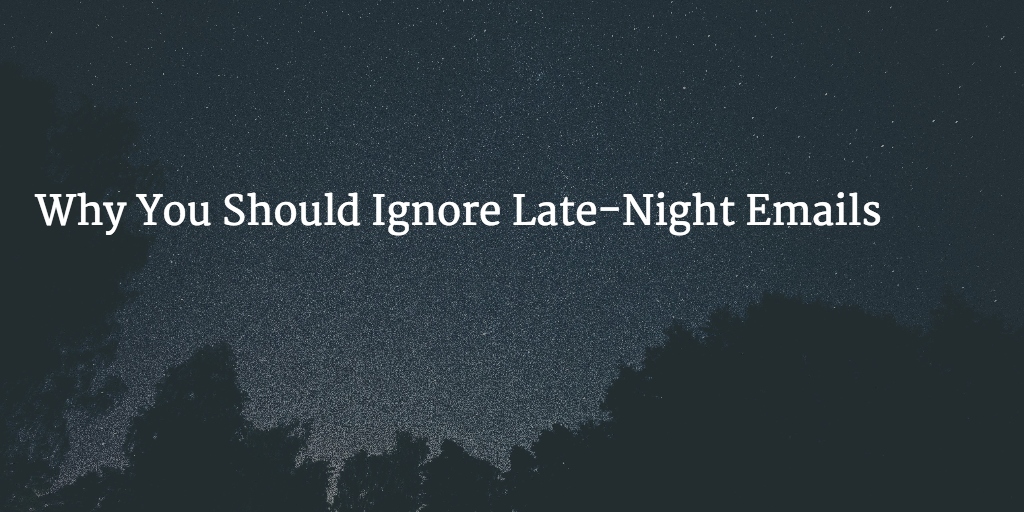
It came, like most terrible and dangerous things, in the night.
OK so like 9:30.
But late enough. It arrived through the buzz of my phone. A new message in my inbox. A message from my new boss. And on week two of my tenure here at iDoneThis. The subject matter was nothing time sensitive, he wanted to introduce me to Jimmy Daly, an excellent writer and content marketer (whom you can find here).
I immediately opened the email and started typing a reply. I was excited. I felt that rush of opportunity. That ah-ha here’s my chance moment. Then I stopped myself. I deleted the draft and put my phone in my pocket. This is dangerous, I realized.
For one, I remembered all the things I’ve read about this, about the negative effects of late-night emails. And the call-and-response arms race that too many companies fall into, everyone engaged in after-hours email one-upmanship. I didn’t want to set that precedent.
But that wasn’t the dangerous part. The dangerous part was that I could already feel the pat on the back I would give myself for being a responsive, on-the-ball guy. Check me out! Mr. Responsive! Too bad it means nothing. This would have been an empty achievement, an artificial celebration for doing something that has absolutely no impact on the performance toward our company’s goals. Me responding to that email at 10 p.m. instead of 10 a.m. in no way helps us make work better for the people we serve. It doesn’t move us forward in any possible way.

After a few weeks of working on a remote team, there’s one thing about it that stands out above anything else. You don’t get all the fluffy, empty extra credit points that come with most jobs. You get no bonus points for showing up to the office early, bringing everyone donuts or being a sharp dresser.
What counts is the work you do. Showing up three hours early can be helpful — if I actually get three extra hours of work done. Otherwise, nobody notices. Playing golf with the boss on the weekend might help your career at other jobs. But my boss is 700 miles away and I’m pretty sure he doesn’t golf.
Speaking of bosses, they’re often cast as the bad guy in this late-night email dilemma. But maybe that’s not exactly the case. If the email I got was a critical, we-gotta-do-this-now kind of message, he would have made that clear. I imagine he had the introduction on his mind, and wanted to send it off before he forgot. Or so he didn’t have to think about it any more. I imagine, during the course of his day, this email was one of the more low-priority things to do.

And I imagine this happens a lot, managers with a day full of high-leverage activities don’t get around to the less-important reminder type messages until later at night. They send an email so they don’t forget, and subordinates scramble to respond. Employees burn energy that should be recharging for the next day and still, some people feel ignored because of how they get treated at work.
Then they give themselves a big dose of self-fulfillment for doing something that — in reality — does’t help the company.
This is totally the opposite of how work used to happen. Before email, if the boss contacted you after-hours it was most definitely a high-priority. It was probably even an emergency. They maybe even had to dig through your HR file to find your home phone number. There was a lot of friction involved in contacting people after hours. And that friction filtered out the low-priority messages.
That friction no longer exists. Low-hanging fruit is just a forward button away from zapping into your inbox at 11 p.m., killing your down time and causing nervous sweats.
Clearly this is a problem. I’m not going to barrage you with 12 ways to fix it. The internet is filled with methods for handling this problem. You can batch email to specific parts of the day, set up an autoresponder, etc. In truth, the best method is going to be the one that works for you. And you won’t need 12 of them.
I will tell you the one thing that’s worked for me. Set aside just one channel of communication for things that must be dealt with after hours. Make this channel precious, convenient and rare. Email or Twitter probably won’t work. Too many people can reach you there.
You need a channel that only close people have access to, but is always nearby. For me, it’s text messaging. If there’s an emergency at midnight, send me a text. I’ll get it immediately, I’ll know who it’s from. But it better be critical that I respond immediately instead of the next day. Otherwise, send me an email.
I’ll be checking it tomorrow.
